GASTROTURF
Karoo Music: The Sound of Rain on a Cool Tin Roof
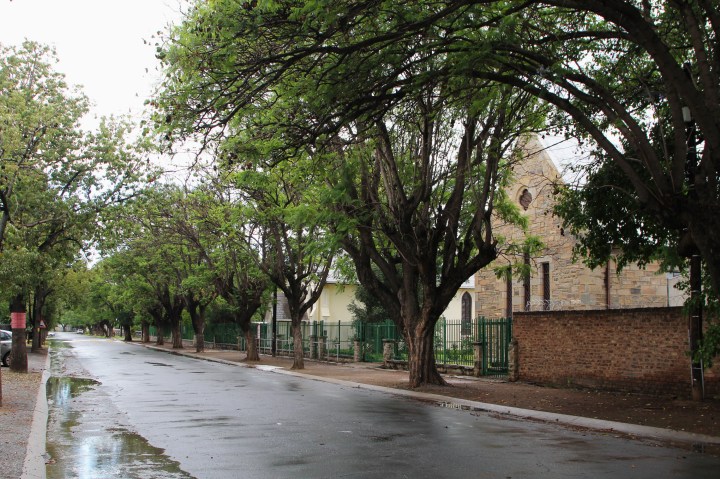
When rain finally came to great tranches of the Karoo this week, you could hear the sigh for hundreds of miles. Farmers danced, flung themselves into rivers and dams, or cried with relief. Dogs ran out of back doors and frolicked in the mud. Even a tortoise seemed to do a slightly wobbly rain dance.
WhatsApp groups throughout the Karoo were buzzing on Wednesday morning. In tin-roof houses in every dorp, in farmhouses with their wraparound stoeps, in neatly-tended hophuise, in grand townhouses and in humble labourers’ cottages on farms, cellphones recorded photos and videos of something as rare to the Karoo as amber or ermine: rain.
‘How much did you get?’ ‘Rooipoort got 29mm.’ ‘Merino 34mm.’ ‘Eldorado 33mm.’ They’re all farms in the Eastern Cape Midlands. Then news came from a friend on a farm 40km from Graaff-Reinet on the Steytlerville side – “50mm here and our dam is filling up for the first time since 2017”. Fifty! And a picture follows of the dam, preening in its abundance.
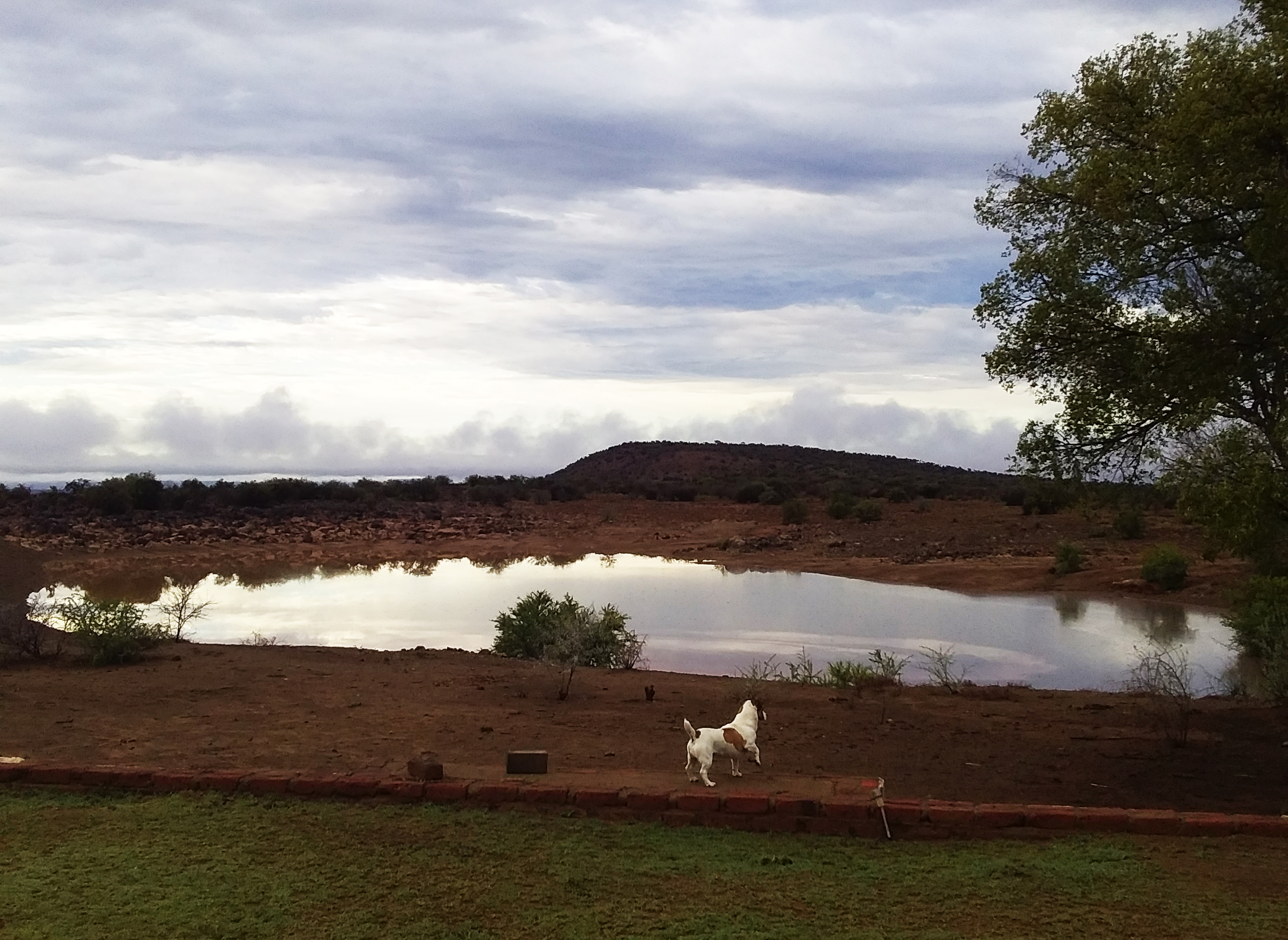 Later his son emails a photo of a tortoise making its way slowly and wetly to its mysterious destination. I imagine it has paused to do a wobbly rain dance.
Later his son emails a photo of a tortoise making its way slowly and wetly to its mysterious destination. I imagine it has paused to do a wobbly rain dance.
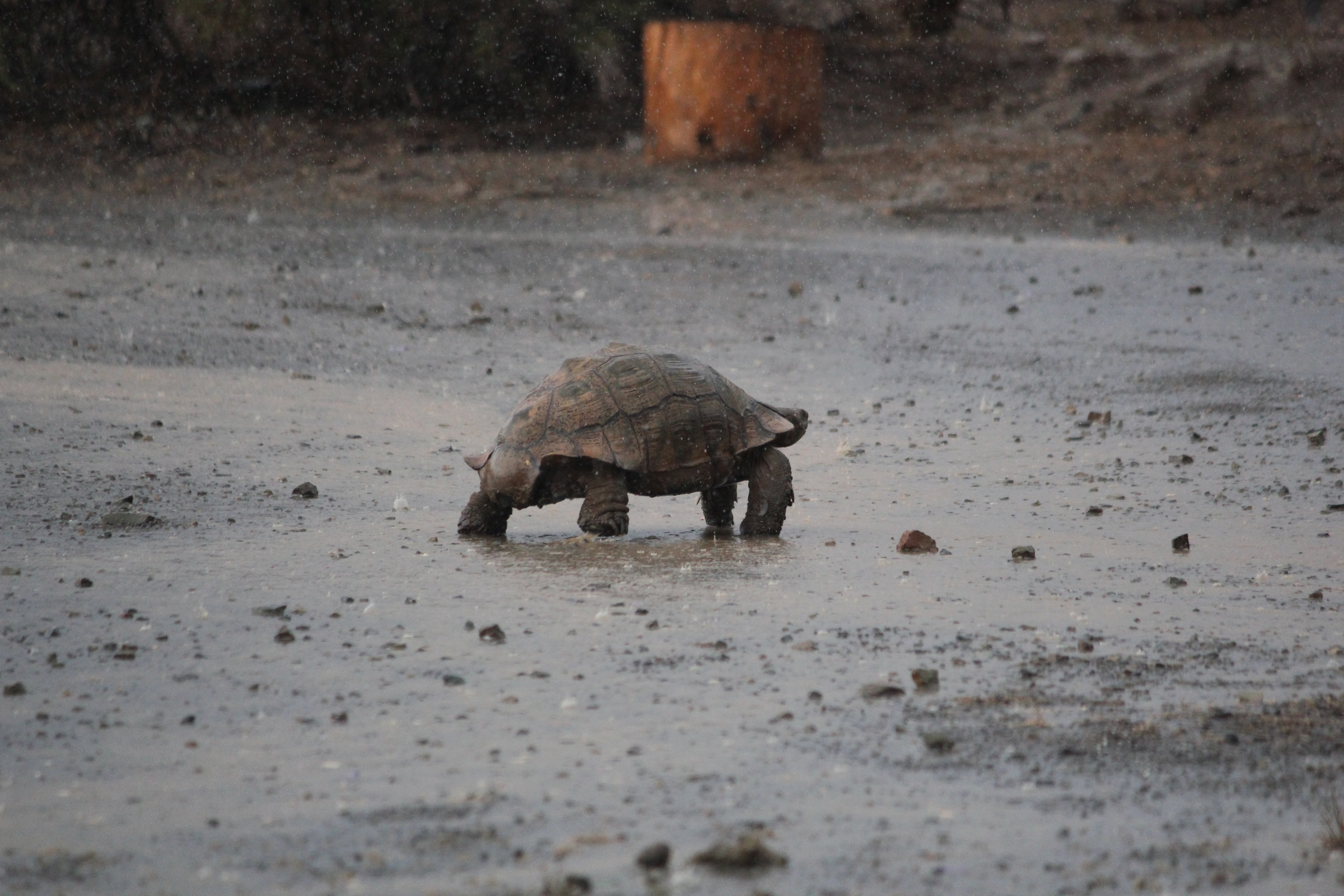
At the height of this week’s rains in Graaff-Reinet, one of the hardest-hit Karoo towns during the ongoing drought, this tortoise was photographed in a street in the town. Photo: Max Wright
Later in the day a video starts doing the social media rounds. A man near Aberdeen, on the road between Graaff-Reinet and Beaufort West, is videoed by his wife as he frolics like a jubilant teenager in the water flowing in a formerly dry river bed. He tumbles, he rolls, he leaps to his feet and does a free-form rain dance. It’s pure, unadulterated joy and a perfect illustration of what it’s like to be blessed with plenty when before there was only deprivation:
On the river bank, his wife sings the chorus of the Coenie de Villiers classic Karoonag with its line “Ruik jy katbos en kambro, as dit reen in die Klein Karoo…”, and no one cares that she’s out of tune and has to correct herself: “I mean innie Groot Karoo.”
De Villiers’ trenchant lyrics, which date to the early Eighties, have long had meaning for me, but when it rains in a drought in the Karoo its meaning is deeper still. Ruik jy katbos en kambro…”. And you’re smelling the Karoo bossies as the water hits the earth and the dormant scents are awakened.
Listen:
I know this is a food column, but there’s no food without rain, for humans or parched animals. There’d been glimmers of hope that the rains would come to the vast interior, but hope is not reality. Too often, they’d watched the horizon and waited. Sometimes the great cumulus would approach; usually it would pass overhead without leaving a gift of rain, then disappear without so much as a nod of recognition for the plight of the humans below. And their animal stock, in the case of the farmers. The promise so swiftly and callously withdrawn creates a special kind of despondency. Yet the hardy people of the arid wastelands find their smile and carry on as best they can.
The significance of the rain cannot be overestimated, even if no one is saying the drought is broken. But everywhere the rain fell this week – and it came in great quantities – the greenness is returning to the Karoobossies without which every day is a struggle to keep the flocks alive. One farmer friend had told me only last week that he doubted he could survive one more month. Days later a downpour brought his farm 20mm. Then came this week’s rains and another 26mm on Tuesday, more the next day…. Now the veld is already starting to green, and the sheep are being high-tailed to the mountain regions where they can graze on sour veld to give the sweeter, more fragile veld of the vlaktes a rest while it regenerates. The depleted veld will take time to recover.
In the wake – in some case, literally, as streams and dams filled up – of the rains, people went around their homes opening every window and door to let the cool air breeze through. Children and their parents ran outside to be drenched by the heavenly downpour. People who only last week had made New Year’s resolutions to stay off the bottle till February opened a bottle of Klippies to toast the gift of water. Families donned gumboots, grabbed a mug of coffee and explored the werf, admiring such innocuous things as puddles, and ground darkly sodden from the soaking, or the green perkiness of spinach leaves which had been limp the day before, still showing the crackly-brown scars of the pummelling they’d had from weeks of too much sun.
Some got out of bed in the middle of the night to check the rain gauge – repeatedly, obsessively. “Switched off everything to just listen to it fall,” said my friend Julienne du Toit, author (with partner-photographer Chris Marais) of this beautiful story about rain. “Then of course the power went out. Still rejoiced. Went to bed early and lay listening to the patter on plants and roof. In the morning woke to the cool breeze. The smell of moist earth!” Things I, before living in the Karoo, had always taken for granted. Not any more.
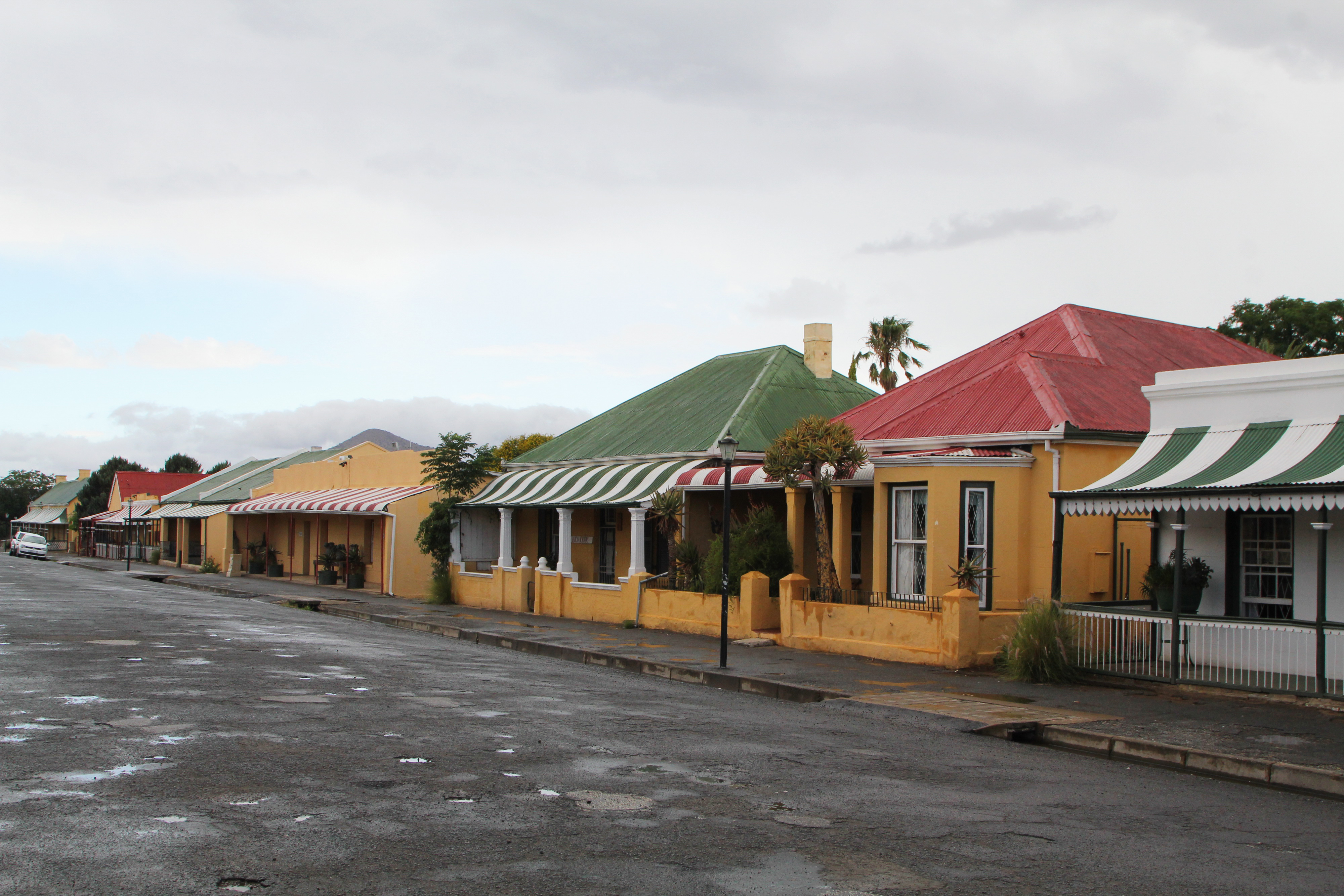
Cradock’s Market Street after this week’s rains. Photo: Chris Marais, www.karoospace.com
On Wednesday morning everyone in the Karoo was out of doors, on the farm or trekking into town, to capture details of the watery harvest on their phone cameras and share with anyone who cared. Which was pretty much everyone in their address book and WhatsApp groups. At least one farm resident I know dreamt that the rain had only been a dream, then woke to find that it was indeed raining, and had been since early afternoon.
On Tuesday night, in her zinc-roof house in town, local maker of jams, preserves and the world’s best Christmas cakes, Heyla Meyer, is in the front room of her dorphuis in the dark. There’s no power, but the rain has been steady on the roof for hours and she’s flung the windows open, poured a large glass of wine, and is sitting in the dark listening to the sound of the rain on her tin roof. Karoo music. At some point she goes outside and stands in the rain, her hands raised to the heavens. It’s better than any shower you can take indoors, she says.
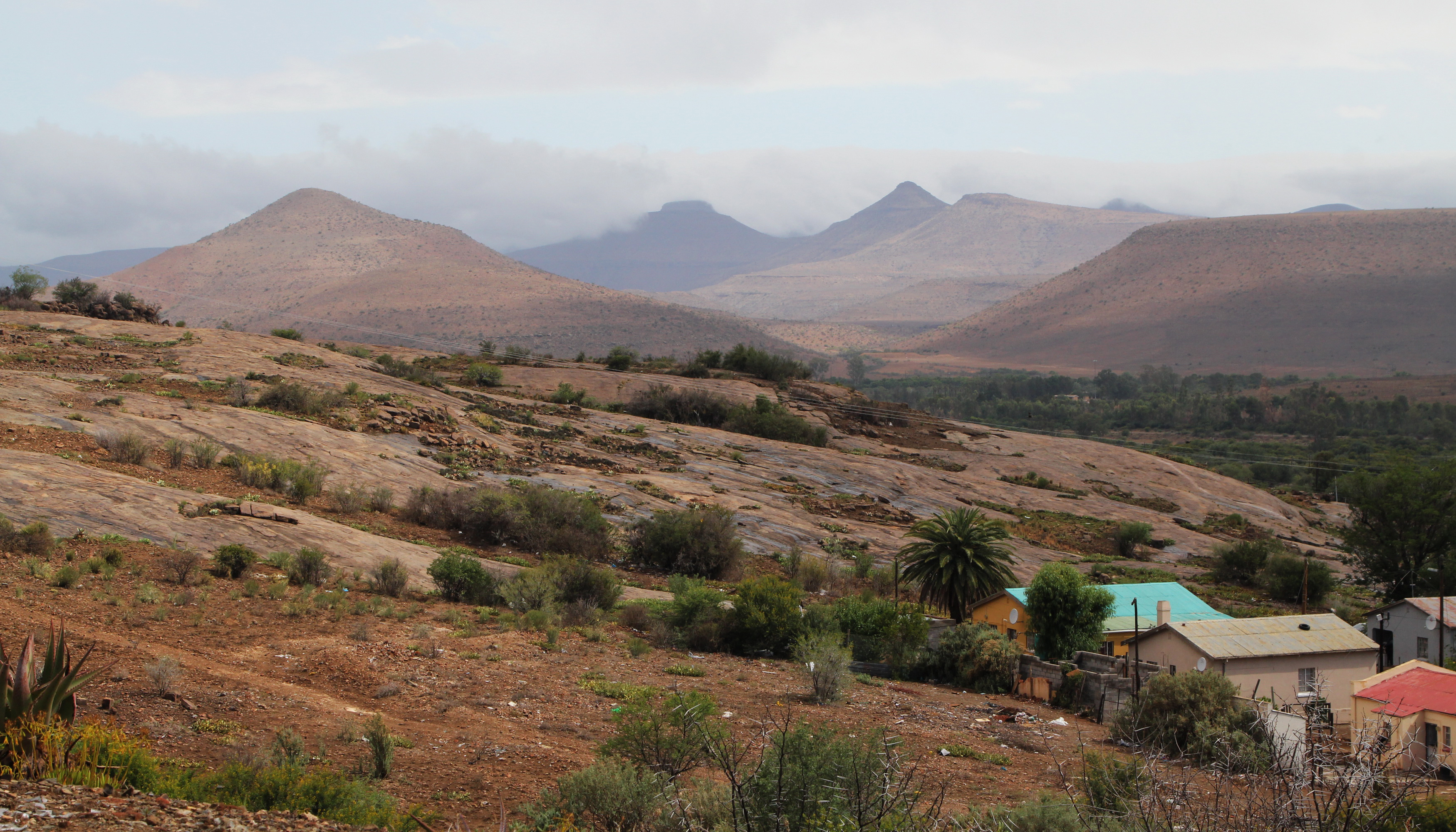
The famous ‘sailing rocks’ outside Cradock, down which the literary figures Olive Schreiner and Iris Vaughan are said to have slid as kids. Photo: Chris Marais, www.karoospace.co.za
High on a mountain in the Eastern Cape Karoo Midlands, on Waterval Farm, local restaurateur Elani Lombard is feeling sick as a dog. Up all night. The rain has poured for hours and she’s in the TV room consoling herself – when the roof caves in. Insulation – seemingly ripped up newspaper – settles all around her along with pieces of ceiling and dust. She gets wet. Yet somehow she finds herself chuckling in her inimitable way, seeing the joy in it. It’s raining, it’s pouring, old man Wentzel is somewhere snoring, but Lani won’t be forgetting the night the rains finally came.
While Lani’s head races between being sick, drenched and joyful, Wentzel is dreaming about the rain. Earlier he’d told Lani and daughter Louzel that he was “taking a whole month’s holiday to celebrate”, then soon reminded himself that farmers don’t get to do that. But the pressure was eased and everywhere farmers like him and son Louwrence felt rejuvenated.
For the Lombards of Waterval, this week’s rains were the first in three years. Holidays are not a thing a drought-embattled farmer can get to enjoy much of. For the God-fearing Lombards, December 2019 had proved to be “one of the most desperate and depressing holidays we’ve had as a family”, friend and TGIFood columnist Louzel Lombard Steyn told me. They had cancelled their planned December trip to the coast because the goats had to be fed and an eye had to be kept on the baboons and monkeys that like to steal the expensive feed. “And to check on the waters,” said Louzel. “It was so hot during these past weeks. If one pump had stopped or a leak occurred and it wasn’t detected immediately, hundreds of goats would have died in those 37+ degrees. My dad and brother were on edge, constantly worrying, fighting and wondering when the rains would come.
“The few remaining water sources fed all the livestock, as well as the game in the veld. During this past holiday, so many small game died. You could smell the rotting carcasses when driving through the veld. In my mom’s garden, we found many orphan baby ribbokkies dead. Their moms had died in the veld and they came to the garden as a last resort for food. There wasn’t much in the garden either.
“Now, with the first good rains, there is finally hope. The worry about water and whether the livestock will have enough to eat and drink will soon be over. In a few weeks, new grazing will start to grow and the veld will start to recover.
“But, like my dad says, this is just the turning point. What lies ahead is a very strenuous recovery period where farmers will need to keep their heads above water. During these desperate times, farmers did anything just to keep livestock alive. Ask any farmer and they’ll tell you that the banks are refusing them any further financial assistance. The land has also taken a massive knock as farmers had no choice but to put livestock in depleted camps.
“Anyway, the point is HOPE. My dad and Louwrence’s absolute hope, resilience and faith in God over this past couple of years has brought me to tears many times. I know it will be better from here.”
The previous afternoon they’d made a video of Wentzel’s grandson, only 13 months old, seeing rain for the first time – the first time – and squealing in his entrancement. The boy is born to a farming life: he will be shown this video in decades to come – the video documenting for posterity the day the rains came, and the people danced and prayed.
Coda 0.1: Vanrhynsdorp
On a farm near Vanrhynsdorp much further west, in the lee of the towering Vanrhyns Pass that leads to Nieuwoudtville and Calvinia in the Hantam Karoo, Willem sits on his stoep reading the jubilant social media posts that are piling up. He smiles but pauses to look at the horizon. Still nothing. The rain has not reached everywhere. But his smile returns, if not for himself, for the many that did get rain.
Coda 0.2: Prince Albert
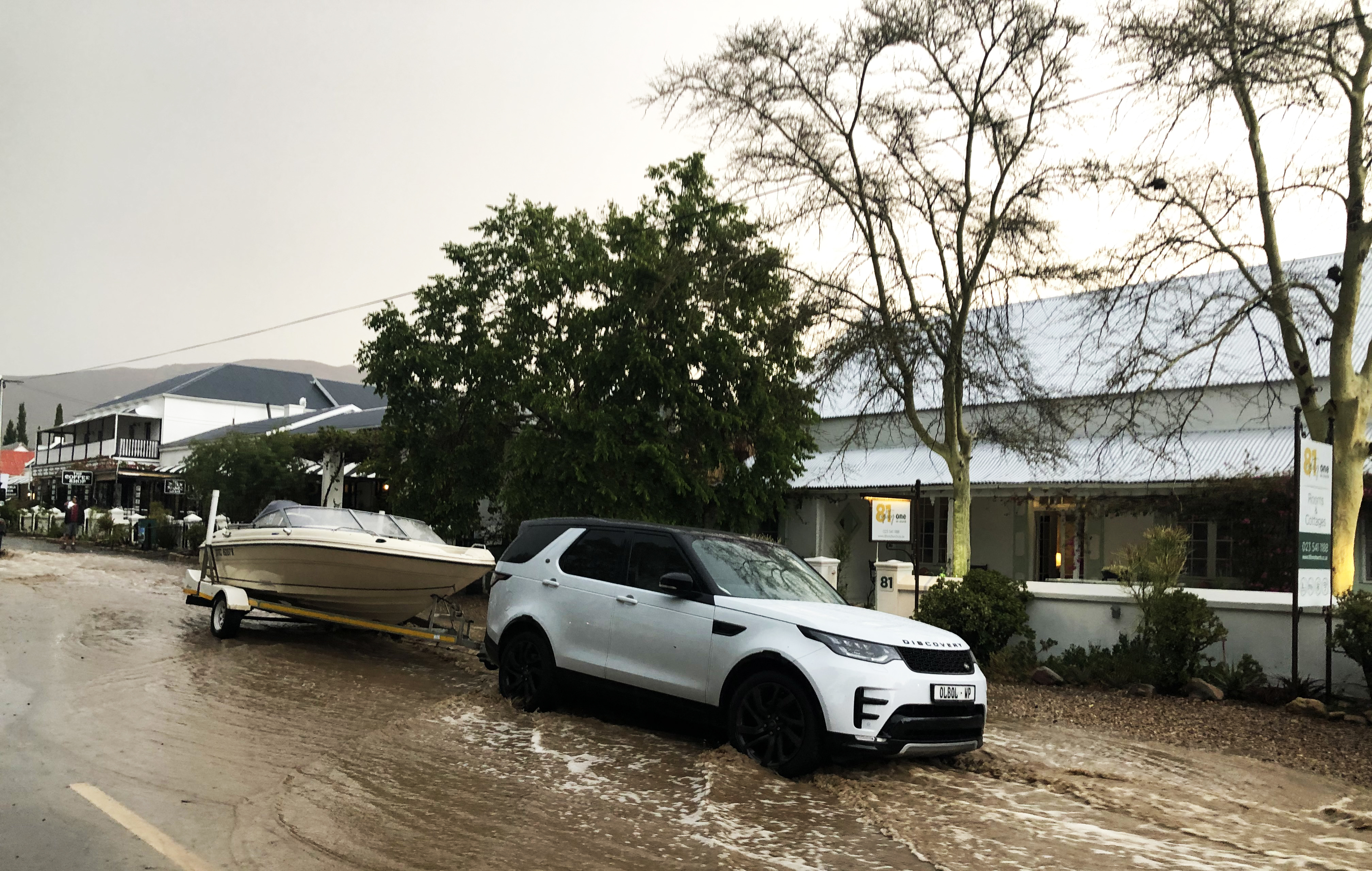
In Prince Albert, somebody even brought along a boat. Photo: Tim Cohen
An earlier draft of this column had included Prince Albert as having had rain relief. Then Elaine Hurford, who’s lived there for decades, messaged me: “No rain!” So I deleted the reference. Two hours later, another message: “F*************k! RAIN!!!!!” And later: “20mm!!!” Not for the first time this week, my eyes moistened. Because when you belong to the Karoo, this stuff is personal. DM



 Become an Insider
Become an Insider